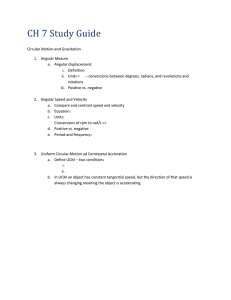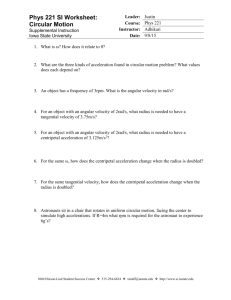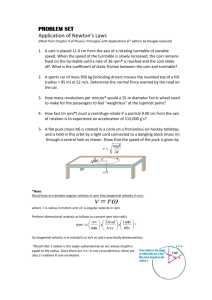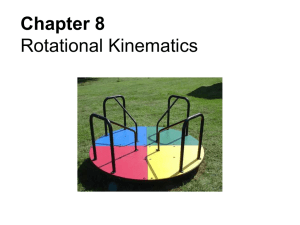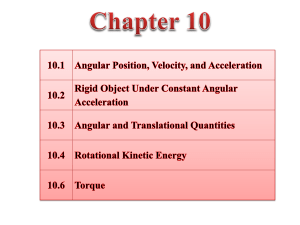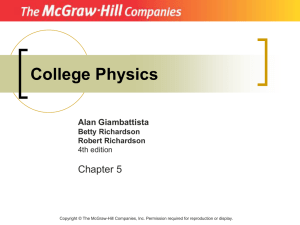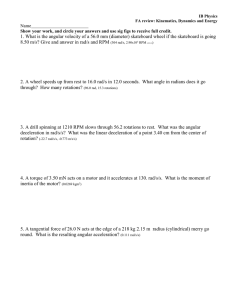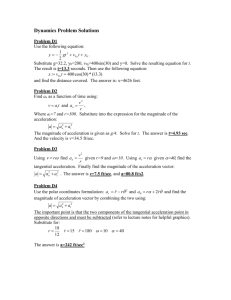Circular Motion
advertisement
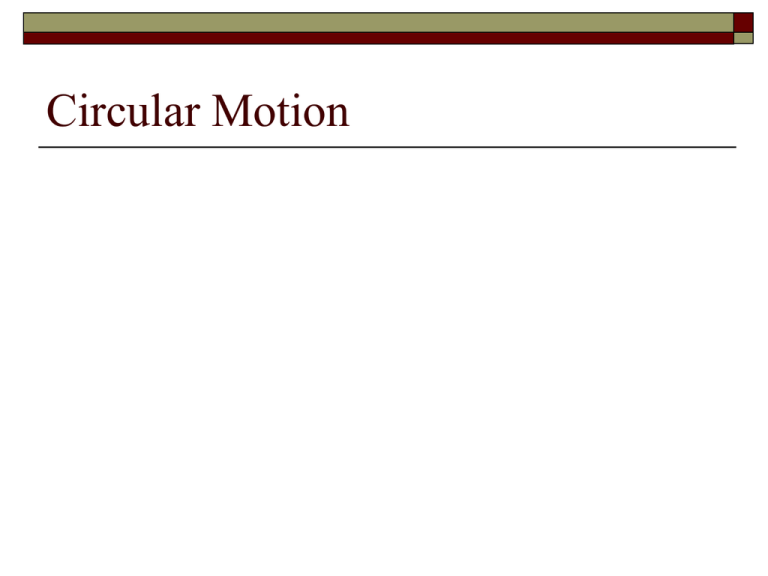
Circular Motion Questions for Consideration How do we measure circular motion? What is a radian? What are the angular analogs of linear motion? What is centripetal acceleration? Circular Motion How do we measure circular motion? Typically use radians. Angle subtended by an arc equal in length to the circle’s radius. Circular Motion Circumference (distance around) = 2r So 2 radians = one full circle. So radians = 180º To convert rad to deg: deg = rad x 180/ 1 rad = 57.3º To convert deg to rad: rad = deg x /180 1º = 0.0175 rad Common Angles Arc Length Arc Length (s) Measured in meters along circumference of circle. Angular Displacement Angular Displacement () Measured in radians. CCW rotation = + CW rotation = - s = r + - Circular Motion A wheel with r = 5.00 m spins counterclockwise so that an ant resting on the top travels 12.0 meters along the rim. Through what angular displacement did the wheel rotate? s = r 12.0 m = (5.00 m)() = 2.40 rad Angular Velocity Angular velocity () = t Expressed as rad/s. Can also be given in terms of revolutions per unit time. revolutions per minute (rpm) 1 rpm = (2 rad) / (60 s) = 0.105 rad/s Tangential Velocity Tangential velocity (v) – the instantaneous velocity of an object moving in a circular path. Imagine a bucket being swung around on a rope. The bucket has a tangential velocity that is perpendicular to the rope. If the rope breaks, the bucket’s tangential velocity will become its linear velocity. Tangential Velocity Formula for tangential velocity: v = r A child is riding a merry-go-round that is rotating at 30 rpm. How fast is the child moving if she is 2.5 m from the center? Given: = 30 rpm r = 2.5 m Want: v=? Tangential Velocity First, convert rpm to rad/s: 30 rpm = (30 * 2 rad) / (60 s) = 3.14 rad/s v = r v = (2.5 m)(3.1 rad/s) = 7.8 m/s Tangential Velocity A satellite moves around the Earth in a circular orbit with r = 10,000 km. If the satellite takes 2.76 hours to complete one orbit, calculate the satellite’s angular and tangential velocities. Given: r = 10,000 km t = 2.76 hr Want: =? v=? Tangential Velocity =/t = (2 rad) / (2.76 hr) = 2.28 rad/hr v = r v = (10,000 km)(2.28 rad/hr) v = 22,800 km/hr Centripetal Acceleration Can something accelerate but maintain a constant speed? Yes, if it changes direction. Acceleration = change in velocity / time Change in velocity = speed up, slow down, or change direction. Centripetal Acceleration Centripetal Acceleration (ac) – causes a change in direction. Perpendicular to direction of motion. Measured in m/s2. ac = v2 r = 2r Centripetal Acceleration Centripetal Acceleration An amusement park ride spins riders around so fast that they are seemingly stuck to the walls. If the ride has a radius of 3.50 meters, what angular velocity (in rpm) is necessary to create a centripetal acceleration of 20.0 m/s2? Given: r = 3.50 m ac = 20.0 m/s2 Want: (in rpm) = ? Centripetal Acceleration ac = 2r 20.0 m/s2 = 2(3.50 m) 2 = 5.71 /s2 = 2.39 rad/s Now convert to rpm: Recall that 1 rpm = 0.105 rad/s (2.39 rad/s) / 0.105 = 22.8 rpm
